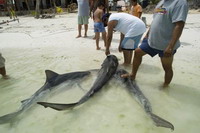Trade oversight body rejects to regulate sharks' consumption
The world's oversight body on wildlife trade refused on Friday to protect two shark species from over-exploitation for a range of food, from supermarket fish-and-chips to gourmet shark fin soup.

The debate on regulating the export of popular sharks was one of the most contentious in the 12-day meeting of the Convention on International Trade in Endangered Species, or CITES, and touched the raw nerve of big-profit industries and national interests.
The European Union asked the triennial CITES conference to control the trade of porbeagle and spiny dogfish, two shark species worth millions of dollars (euros) a year in international trade.
The preliminary decision by the 171-nation body dismayed environmental groups, which cited the rapid decline of sharks, which are slow to reproduce and which have become increasingly popular for dining tables in Europe and Japan.
Both species "are in a tailspin due to overfishing and poor management," said Greenpeace activist Carroll Muffett.
The decision by a technical committee must be confirmed in the full plenary next Friday.
Germany, which sponsored the proposal, said it would try to overturn the outcome, in which a majority of voting countries supported the resolution but not enough for the required two-thirds.
"We still have time to explain our arguments to some parties who had doubts," delegation chief Jochen Flasbarth told reporters.
Only about 100 countries cast votes, and several delegations were expected to arrive only for the crucial second week.
CITES, a 1975 treaty, lists more than 7,000 animals and 32,000 plants that are subject to trade regulations and require export permits. About 800 of them are banned entirely.
Norway, speaking for many opponents, said CITES was the wrong forum to deal with the shark problem.
"We are concerned at the growing involvement of CITES in commercial issues," Norwegian delegate Oestein Stoerkersen told the meeting.
Many delegates cited a report by the U.N. Food and Agricultural Organization, which recommended against regulation. The FAO said that although stocks have been degraded in many areas, the species are widely distributed in the world's oceans and are not threatened with extinction.
But the United States swung behind the proposal. "This is about more than these two species," U.S. delegate David Cottingham told the conference. "We remain concerned about the serial depletion of one shark species after another."
Three shark species already are listed for trade restrictions: the great white shark, the basking shark and the whale shark.
Both the porbeagle and spiny dogfish are slow to mature and do not reproduce until their teens, making them vulnerable to overfishing. The spiny dogfish became so popular in Europe that its waters were depleted by the 1980s. The World Wildlife Fund for Nature said reproductive females declined 95 percent in the Northeast Atlantic and by 75 percent in the Northwest Atlantic off the American coasts.
The spiny dogfish is known as rock salmon in some European markets and is commonly served as fish and chips. The porbeagle has among the most valuable marine meat and is eaten fresh, frozen or dried and salted. It's fin is used in Asia for soup.
In other decisions, the United States was heavily outvoted on its bid to remove bobcats from a protected list. Though the bobcat is not threatened with extinction, it is almost indistinguishable from the Iberian lynx, which is highly endangered.
But the conference agreed to totally ban trade in the slow loris, a wide-eyed nocturnal primate found in the forests of Southeast Asia. Traded as pets, the small monkey also is suffering from the deforestation and shrinking habitat.
Proposals to increase protection for four types of North African gazelles failed, while a trade ban was accepted for the highly threatened Slender-Horned Gazelle found in the Sahara desert.
Subscribe to Pravda.Ru Telegram channel, Facebook, RSS!




